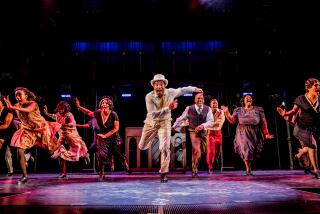Pianist Pete Jolly Mines the Standards for Gold
- Share via
Pianist Pete Jolly has been a major musical presence in Los Angeles since the 1950s. One of the fixtures of the West Coast jazz movement, he performed prominently with Shorty Rogers’ Giants, as well as with dozens of artists ranging from the high visibility Herb Alpert and the Tijuana Brass to less conspicuous--but no less vital--work as a gifted studio artist, playing keyboards ranging from piano and accordion to Hammond organ and the musette.
But Jolly never lost his taste for jazz and has continued to parallel his studio activities with a regular menu of club appearances and recordings, usually as part of a trio. On Thursday night at Spazio in Sherman Oaks--surely one of the most attractive jazz settings in town--he offered a collection of typically upbeat jazz variations. Although he emphasized standards from the Great American Songbook, he balanced familiar items with more obscure numbers, finding the musical gold in each.
For the record:
12:00 a.m. July 11, 2001 FOR THE RECORD
Los Angeles Times Wednesday July 11, 2001 Home Edition Part A Part A Page 2 A2 Desk 1 inches; 19 words Type of Material: Correction
Bassist--In a Saturday Calendar review of jazz pianist Pete Jolly, his trio’s bass player was misidentified. The musician was Bob Maize.
Jolly was, as always, a dependable interpreter, providing lovely harmonic views of tunes such as “Dearly Beloved,” “Cabin in the Sky” and “I’ve Never Been in Love Before.” A strong melodist, he maintained contact with the thematic content of each song he played, tapping into the emotional content of the ballads, energizing the up-tempos with subtle rhythmic drive. In each case, his efforts were enhanced by longtime associate Nick Martinis, who seemed to intuit every accent, every shift of gear in Jolly’s delivery.
Jolly’s trio also included the gifted bassist Roberto Miranda. Although Miranda was apparently a last-minute replacement for another bassist, he fit superbly into the trio’s improvisational flow. In fact, most numbers were laid out with Jolly offering the opening theme and Miranda immediately following with a set of spontaneous variations. The results were impressive--a fast-moving pizzicato romp through “What Is This Thing Called Love?” and a bowed solo on “Can’t We Be Friends?” were among the highlights. And, during his solo on “I Should Care,” when Miranda reached for a high note that was simply not on the instrument, both he and the audience shared a brief bit of laughter.
It was a characteristically engaging moment in the Jolly trio performance--one generated by a veteran pianist who continues to produce amiable, entertaining jazz.
More to Read
The biggest entertainment stories
Get our big stories about Hollywood, film, television, music, arts, culture and more right in your inbox as soon as they publish.
You may occasionally receive promotional content from the Los Angeles Times.










